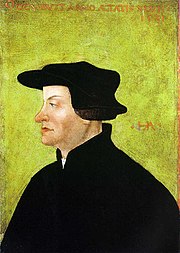Portal:Reformed Christianity/Selected article/6
Huldrych Zwingli (1 January 1484 – 11 October 1531) was a leader of the Reformation in Switzerland. Born during a time of rising Swiss patriotism and increasing criticism of the Swiss mercenary system, he attended the University of Vienna and the University of Basel, a scholarly centre of humanism. In 1519, Zwingli became the pastor of the Grossmünster in Zürich where he began to preach ideas on reforming the Church. The Reformation spread to other parts of the Swiss Confederation, but several cantons resisted, preferring to remain Roman Catholic. Zwingli formed an alliance of Reformed cantons which divided the Confederation along religious lines. Zwingli’s ideas came to the attention of Martin Luther and other reformers. They met at the Marburg Colloquy and although they agreed on many points of doctrine, they could not reach an accord on the doctrine of the presence of Christ in the Eucharist. In 1531 Zwingli’s alliance applied an unsuccessful food blockade on the Roman Catholic cantons. The cantons responded with an attack at a moment when Zürich was badly prepared. Zwingli was killed in battle at the age of 47. His legacy lives on in the confessions, liturgy, and church orders of the Reformed churches of today.
